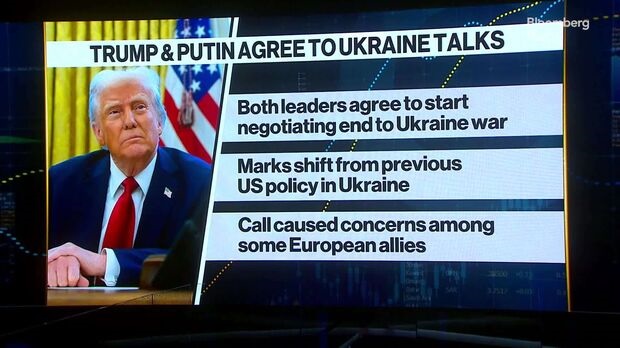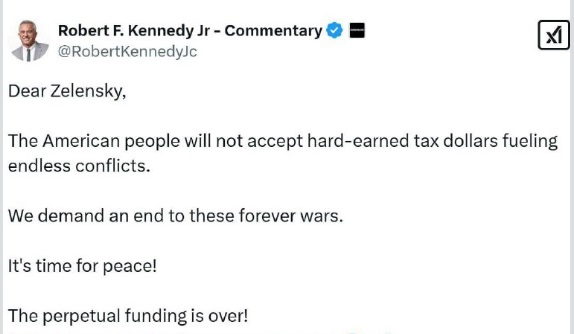
Whatever the US president decides is his goal for Ukraine, one thing is clear: Europe isn’t ready to shoulder its huge share of the burden, Bloomberg notes.
Donald Trump is starting to tell European Union leaders what they need to do if they want to secure peace in Ukraine. His demands are set to push the bloc to its limits.
Trump spoke with Vladimir Putin on Wednesday, setting the wheels in motion for peace talks, just as his defense secretary was explaining to his European allies that they are going to have to shoulder most of the burden for any settlement. Bloomberg Economics calculates that protecting Ukraine and expanding their own militaries could cost the continent’s major powers an additional $3.1 trillion over the next 10 years.
Some leaders and many security officials are warning that if the Europeans fail to mount a convincing deterrent then Putin will only increase his attempts to weaken and ultimately even break up both the EU and the NATO alliance.
“President after president knew that transatlantic security benefited both the US and Europe,” former UK Defense Secretary Ben Wallace told Bloomberg. “It seems Trump thinks he knows better. History shall be the judge of this decision.”
European officials were stunned by Trump's call with Putin, a major diplomatic move of which key allies had gotten no notice, two officials said. Another European supporter of Ukraine called it a sell-out, saying that the US is giving in to Putin's key demands even before talks begin.
The dramatic developments laid bare the scale of the challenge facing the Europeans and it’s one for which, right now, they are largely unprepared.
Russia has a significant manpower advantage over Europe and its war economy can churn out shells and other military equipment at a rate that exceeds the army’s needs for the front line in Ukraine, according to one senior European official.
EU members, meanwhile, are arguing over whether they should limit procurement to European suppliers – who won’t be ready to deliver some of the weapons they need for years – rather than working with the British or buying from the Americans. Others have indicated the bloc should be investing in roads rather than artillery.
Around the time that Trump and Putin were speaking, Defense Secretary Pete Hegseth was setting out the US view at a meeting with his NATO counterparts in Brussels. Hegseth said it’s not realistic to think of Ukraine joining the western alliance or recapturing all of the territory lost since 2014 and the US will not be supplying troops to any peacekeeping force.
Hegseth added that he’s convinced NATO will prosper, so long as its European members play their part. “This won't just happen,” he said. “It will require our European allies to step into the arena and take ownership of conventional security on the continent.”
But the Europeans are worried that no one on the Trump team has any real experience of negotiating with the Russians, one official said. Most of Putin’s team have decades of experience dealing with the US and Ukraine and learned their trade in the Russian secret services.
“They're gonna need somebody who knows how to negotiate with the Kremlin,” said Charles Kupchan, a senior fellow at the Council on Foreign Relations, who worked on implementing previous accords with Russia in the Obama White House. “The pitfalls are that the Russians end up running circles around the American team and that Trump ends up negotiating a bad deal that in the end of the day isn't really a deal."
To make matters worse for the Europeans, most of their everyday communications with the US administration has been shut off since Trump took office for a second time last month, according to two officials, leaving them reliant on formal phone calls, set-piece meetings and public statements.
The EU faces an unprecedented juggling act as it tries to salvage a partnership with Trump over Ukraine while also preparing to retaliate against US tariffs on European exporters. The EU’s continued reliance on the US for its security gives Trump leverage as he seeks to use Washington’s economic muscle to reset the transatlantic trading relationship.
To mobilize resources on the scale required, European governments would need to radically rethink how they structure their budgets, to work with executives to re-engineer their defense industries, and, almost certainly, agree to joint debt issuance. That will require a level of political will, far-sighted thinking and sacrifice that many EU members have so far failed to demonstrate, particularly in western Europe, where some still see the war as a far-off problem. Berlin, Rome and Paris have also resisted efforts to seize some $300 billion of frozen Russian central bank assets and use that money to help Ukraine.
It’s going to mean making difficult choices about spending on health, education and welfare.
The outcome of this month’s election in Germany will be critical, with the conservative Friedrich Merz on track to replace Social Democrat Chancellor Olaf Scholz.
In the nightmare scenario for Kyiv, Trump might lose interest in Ukraine’s future before any settlement has been reached, shutting off military and financial aid and leaving the Europeans to deal with the problem.
Any US refusal to deploy troops on Ukrainian soil as part of any potential security guarantees to Kyiv, may well be interpreted in European capitals and in Moscow as a sign that US commitment to NATO is waning, officials say.
It also increases the urgency of the fundamental question that lies behind all the EU’s discussions on Ukraine. Do its members want to act as a collective with geopolitical muscle, or a trading bloc in which members put their own national interests first in dealing with the world’s real powers?

read more in our Telegram-channel https://t.me/The_International_Affairs

 10:51 19.02.2025 •
10:51 19.02.2025 •






















